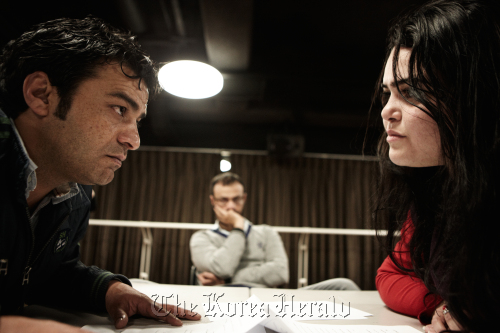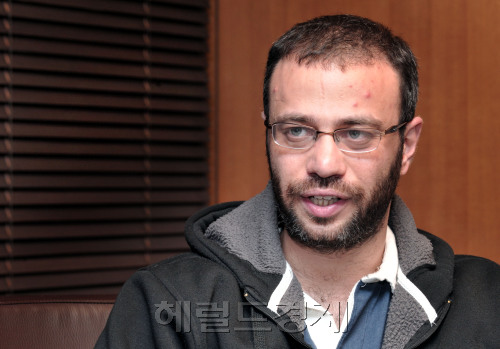Syrian drama sheds light on uprising in the country
By Claire LeePublished : April 16, 2012 - 18:46
Syrian play ‘Can You Please Look at the Camera’ premieres in Seoul
Aside from producing the show in secret in Damascus, Syrian director Omar Abu Saada and his six-member troupe had to fly to the other side of the world to showcase their politically-conscious play for the first time.
The troupe’s piece, “Can You Please Look at the Camera?” deals with the ongoing Syrian uprising against current President Bashar al-Assad and his regime, and the real-life case of protestors who were imprisoned while participating in public demonstrations. Saada and his team arrived in Korea on April 6 for the play’s first run, which starts on Tuesday at Doosan Art Center in central Seoul.
Aside from producing the show in secret in Damascus, Syrian director Omar Abu Saada and his six-member troupe had to fly to the other side of the world to showcase their politically-conscious play for the first time.
The troupe’s piece, “Can You Please Look at the Camera?” deals with the ongoing Syrian uprising against current President Bashar al-Assad and his regime, and the real-life case of protestors who were imprisoned while participating in public demonstrations. Saada and his team arrived in Korea on April 6 for the play’s first run, which starts on Tuesday at Doosan Art Center in central Seoul.

The Syrian authorities do not allow uprising-themed plays to be performed in the country.
“I am certainly not happy (that the piece cannot be performed in Syria),” Saada said during an interview with The Korea Herald in Seoul.
“This play is about Syria so I want the people of Syria to see it. I’m planning to stage the piece in Beirut, Lebanon, pretty soon, so at least people living in Syria’s bordering country can have an opportunity to see.”
This isn’t the director’s first time visiting Seoul. He was one of the foreign artists featured in Gyeonggi Creation Center’s residency program last year. During his stay, Saada created a monodrama about the Syrian uprising, mixing the theatrical play with video footage of violent protests and armed clashes.
Saada said he became a theater director more “by accident than by intent.” It all began as he decided to produce a play with his friends on a whim while majoring in electrical engineering in college.
He later pursued a degree in drama at the Higher Institute for Dramatic Arts in Damascus. Since forming his own production house, “Studio Theater,” in 2002, he has been showcasing some unconventional works ― including his 2006 work “Poster,” which was about the Palestinian and Israeli conflict.
“I personally think all theater plays have to be political in some says,” Saada said. “All artists have their opinions on things, and mine is a political one. So I express them with my theater works. Doing so is important to me.”
In the upcoming play, Saada focuses on the stories of Syrian protesters who were imprisoned “illegally” by the armed forces of the government. The plot of the piece develops as its protagonist Noura, who is a documentary filmmaker and is a supporter of the government-resistance movement, tries to make a film about the people who were jailed during demonstrations. The filmmaker’s original views on the uprising changes as she interviews her sources. While making the movie, she also runs into Ghassan, a man who is very against the idea of the street demonstrations and the resistance against the regime.

“Noura goes through a big change throughout the play,” said Saada.
“But her change does not take a form of a straight line; it’s not a simple transition which goes from one point to the other. Her change is all about going up and down, and going up and down again. And Noura’s experience is very similar to the current situation in Syria, and the psychological state of its people. Everyone in Syria is going up and down everyday. We don’t know what’s going to happen the next day.”
Throughout the interview, Saada used the word “revolution” whenever referring to the ongoing uprising against the nearly five decades of Arab Socialist Baath Party rule. Saada refused to comment when asked if he had been involved in any political activities aside from producing his plays. But he shared his solid view on the current situation in Syria, where at least 7,500 civilians have been killed by the violence.
“In the play, Ghassan and Noura have very different views on Syria,” he said. “But what’s important is that they somehow have to live with each other in spite of their conflicted views. I think that’s the most important thing.”
Coming to Seoul to stage this show wasn’t easy for Saada and his troupe. They had to practice in secret in Syria, and had to go through “many risks and difficulties” to make it happen. “Watching a play is experiencing the sharing of emotions, memories and images,” said Saada. “That’s what I want to do with my audience in Seoul, and I’m happy to share the situation in Syria with them.”
A few days after his arrival in Seoul, Saada grabbed a cab and the driver asked where he was from.
“When I told him I was from Syria, the driver said he is aware the situation in my country,” said Saada. “I don’t think people in Seoul are not familiar with what’s going on in Syria. The play is also about the human experience and relationships, which I think the audience members Seoul can easily relate to.”
The show, which will be performed in Arabic, will run at Doosan Art Center in Seoul until April 29. Korean and English subtitles will be available. Tickets range from 10,000 won to 30,000 won. For tickets and information, call (02) 708-5001.
By Claire Lee (dyc@heraldcorp.com)



![[Herald Interview] 'Amid aging population, Korea to invite more young professionals from overseas'](http://res.heraldm.com/phpwas/restmb_idxmake.php?idx=644&simg=/content/image/2024/04/24/20240424050844_0.jpg&u=20240424200058)







![[Hello India] Hyundai Motor vows to boost 'clean mobility' in India](http://res.heraldm.com/phpwas/restmb_idxmake.php?idx=644&simg=/content/image/2024/04/25/20240425050672_0.jpg&u=)






![[Today’s K-pop] NewJeans' single teasers release amid intrigue](http://res.heraldm.com/phpwas/restmb_idxmake.php?idx=642&simg=/content/image/2024/04/26/20240426050575_0.jpg&u=)